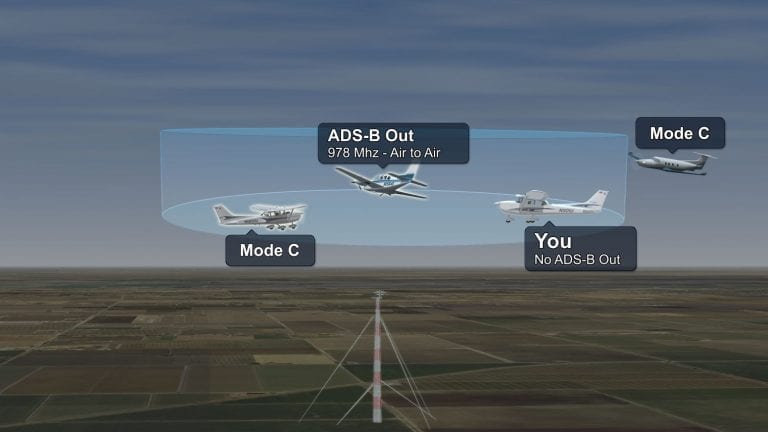
Portable ADS-B receivers for the iPad (like the Sentry, Garmin GDL 50 and Stratus 3) can receive ADS-B traffic in addition to weather. But unlike weather, which is broadcast continuously, traffic is only transmitted in certain cases. This can make ADS-B traffic very confusing—when does it work and when does it not work?
To help, we’ve created this series of graphics, which shows three common scenarios:
Graphic 1: The worst case scenario, where you are flying with a portable ADS-B receiver, but you do not have an ADS-B Out transponder installed in your panel and there are no ADS-B ground stations in range. Here, you’ll receive any airplane that is transmitting ADS-B Out via air-to-air transmission (no ground station required, so the lack of coverage does not matter). Not all airplanes have ADS-B Out, though, so you will see some traffic but definitely not all. In particular, you will not see Mode C targets.
 Graphic 2: In this case, you are still flying with a portable ADS-B receiver and no ADS-B Out in your airplane, but you are close to another aircraft that is ADS-B Out equipped and there is a ground station in range. In this case, that ADS-B Out airplane is waking up the ground station and is receiving a custom traffic picture for a 30-mile diameter “hockey puck” around that airplane. If you are close enough to that airplane, your portable receiver can listen in on that traffic message and display targets.
Graphic 2: In this case, you are still flying with a portable ADS-B receiver and no ADS-B Out in your airplane, but you are close to another aircraft that is ADS-B Out equipped and there is a ground station in range. In this case, that ADS-B Out airplane is waking up the ground station and is receiving a custom traffic picture for a 30-mile diameter “hockey puck” around that airplane. If you are close enough to that airplane, your portable receiver can listen in on that traffic message and display targets.
While you won’t get a complete traffic picture, you will get a better one, since the ground station transmits Mode C targets in addition to ADS-B targets. Just remember that you don’t know what you don’t know—there could be a target just outside the hockey puck that’s not showing up (the red airplane in the graphic above) because the hockey puck is not centered on you.
 Graphic 3: This is the best possible case. You have an ADS-B Out transponder in your airplane, so you are transmitting out to the ground stations and creating your own “hockey puck” of traffic information. You’ll see all traffic within a 30 mile diameter and +/- 3500 ft. This includes all ADS-B Out traffic and Mode C traffic. You’ll also see ADS-B Out traffic beyond the hockey puck, via a direct, air-to-air transmission. The only traffic not visible would be airplanes without any type of transponder. That means you still need to look outside, but it’s highly likely that you’ll see all the airplanes nearby.
Graphic 3: This is the best possible case. You have an ADS-B Out transponder in your airplane, so you are transmitting out to the ground stations and creating your own “hockey puck” of traffic information. You’ll see all traffic within a 30 mile diameter and +/- 3500 ft. This includes all ADS-B Out traffic and Mode C traffic. You’ll also see ADS-B Out traffic beyond the hockey puck, via a direct, air-to-air transmission. The only traffic not visible would be airplanes without any type of transponder. That means you still need to look outside, but it’s highly likely that you’ll see all the airplanes nearby.
Here’s a helpful video showing ADS-B traffic in action in the ForeFlight app:
If you have ADS-B Out and you feel like you’re not seeing a full traffic picture, there are some options for troubleshooting. Read this article for detailed steps.
The complete graphic is below (click on the image for a larger view)
The post Understanding ADS-B traffic: when can you trust it? appeared first on iPad Pilot News.
Source: Ipad appsUnderstanding ADS-B traffic: when can you trust it?

